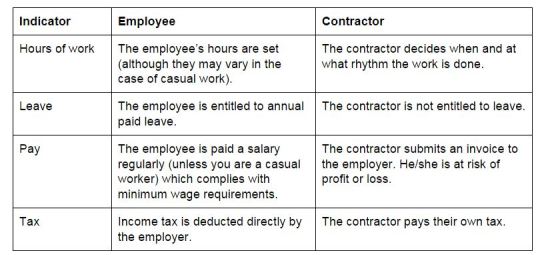It is important for a business to know the difference between a contractor vs an employee. This is because they owe different responsibilities to each other and each party has different rights and obligations when dealing with each other. Sometimes this can be hard to establish but an employee can look at how an employee behaves in order to determine whether a worker is a contractor or an employee.

Get your Full Time Employment Agreement legal document for free.
Who is an Employee?
Generally speaking, an employee is a person who agrees to provide labour for a company and thus becomes part of the company. Therefore, all employees must have an employment agreement that sets out the expectations and responsibilities. The specific terms will dictate any specific benefits and such but at a fundamental level, all employees:
- Work for a specified number of hours (e.g. full-time employees work for around 38 hours a week)
- Receive parental leave and paid leave
- Minimum rates of pay
- Have limited control over how they work because they strictly follow employer instructions
- Usually, have continuous work
- Has no financial risk- that is for the employer to manage
- Receives superannuation from the employer
- Has their income tax deducted by their employee
- Receives pay regularly
Who is a Contractor?
A contractor is a person who agrees to do work for a company usually to fulfill a specific task but is not part of the company. Often they are an alternative to hiring an employee. This allows each contractor agreement to fit the parties’ purposes rather than be broad or unclear.
Essentially, a contractor works for themselves. This is because they are specialists at what they do and contract their services to whoever is in need. As a result, they have a lot more freedom to dictate their working conditions. In general, contractors:
- Don’t have a minimum pay
- Have greater control over how the work is done
- May accept and refuse jobs as they see fit
- Don’t receive sick or paid leave
- Aren’t promised continuous work
- Can negotiate working hours
- Bear financial risk
- File their own taxes
- Pay their own superannuation
- Gets paid by invoices sent to the company
Difference Between a Contractor vs an Employee?
There isn’t one major difference that separates an employee from a contractor. Instead, they differ in multiple ways, like:
- the way they work,
- the number of hours they work,
- any benefits they receive,
- how they receive pay
The table below sets out some of the key differences and a more comprehensive table is available here.

Contractor vs Employee: Who Should You Hire?
How do you decide between hiring a contractor vs an employee. Well, it’s all about your business needs. Overall, employees are more beneficial for a company in the long run. This is because they provide for stability, increased productivity and are invested in the company. It is important that the company does well so that they may receive further benefits and grow in their career.
Contractors, on the other hand, do provide more flexibility, however, they are more complex to administer from the employer’s perspective. A contractor is very useful however if you have one specific task you would like done and employing a specialist would be too expensive for the business.
Contractors
Pros
- Freedom to decide the terms of the agreement including the price;
- You do not owe the contractor any leave;
- You employ a contractor for a specific task rather than a time frame;
- The contractor provides the materials and equipment;
Cons
- Creating a quality contract requires attentiveness to all legal requirements like insurance, superannuation and dispute resolutions processes;
- An unclear contract will lead to disputes;
- You must meet external standards like superannuation deadlines or determine whether to pay payroll tax.
Employees
Pros
- There is stability and increased productivity in the long term;
- Your costs are fixed throughout the year.
Cons
- Limited flexibility.
Key Takeaways
Deciding whether the hire a contractor vs an employee can be an important decision for your business to make. Both contractors and employees have their perks and their disadvantages. Whether you choose to hire a contractor or an employee, it’s best to hire someone you know will be a dedicated worker and add value to your business.




